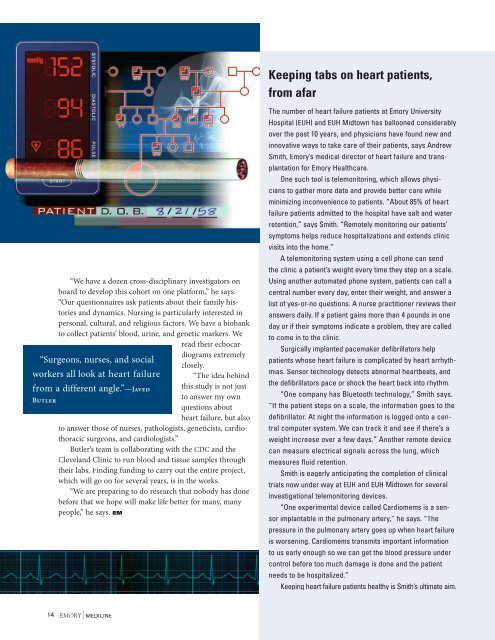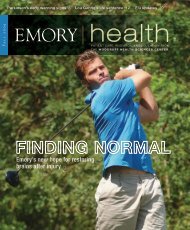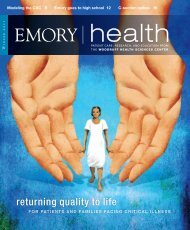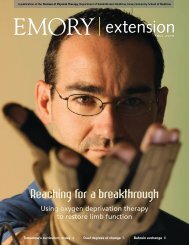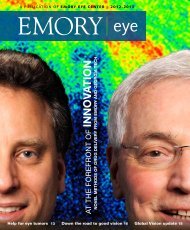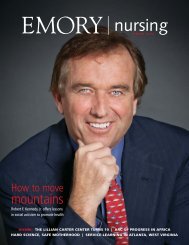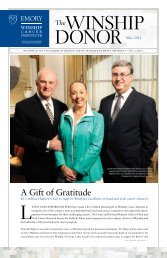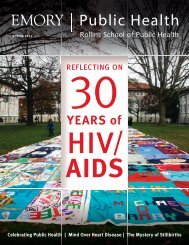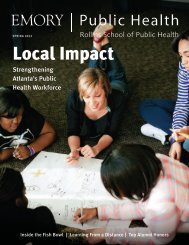medicine - Woodruff Health Sciences Center - Emory University
medicine - Woodruff Health Sciences Center - Emory University
medicine - Woodruff Health Sciences Center - Emory University
Create successful ePaper yourself
Turn your PDF publications into a flip-book with our unique Google optimized e-Paper software.
“We have a dozen cross-disciplinary investigators on<br />
board to develop this cohort on one platform,” he says.<br />
“Our questionnaires ask patients about their family histories<br />
and dynamics. Nursing is particularly interested in<br />
personal, cultural, and religious factors. We have a biobank<br />
to collect patients’ blood, urine, and genetic markers. We<br />
read their echocardiograms<br />
extremely<br />
“Surgeons, nurses, and social<br />
closely.<br />
workers all look at heart failure “The idea behind<br />
from a different angle.”—Javed this study is not just<br />
Butler<br />
to answer my own<br />
questions about<br />
heart failure, but also<br />
to answer those of nurses, pathologists, geneticists, cardiothoracic<br />
surgeons, and cardiologists.”<br />
Butler’s team is collaborating with the CDC and the<br />
Cleveland Clinic to run blood and tissue samples through<br />
their labs. finding funding to carry out the entire project,<br />
which will go on for several years, is in the works.<br />
“We are preparing to do research that nobody has done<br />
before that we hope will make life better for many, many<br />
people,” he says. EM<br />
14<br />
EMORY MEDICINE<br />
Keeping tabs on heart patients,<br />
from afar<br />
The number of heart failure patients at <strong>Emory</strong> <strong>University</strong><br />
Hospital (EUH) and EUH Midtown has ballooned considerably<br />
over the past 10 years, and physicians have found new and<br />
innovative ways to take care of their patients, says Andrew<br />
Smith, <strong>Emory</strong>’s medical director of heart failure and trans-<br />
plantation for <strong>Emory</strong> <strong>Health</strong>care.<br />
One such tool is telemonitoring, which allows physi-<br />
cians to gather more data and provide better care while<br />
minimizing inconvenience to patients. “About 85% of heart<br />
failure patients admitted to the hospital have salt and water<br />
retention,” says Smith. “Remotely monitoring our patients’<br />
symptoms helps reduce hospitalizations and extends clinic<br />
visits into the home.”<br />
A telemonitoring system using a cell phone can send<br />
the clinic a patient’s weight every time they step on a scale.<br />
Using another automated phone system, patients can call a<br />
central number every day, enter their weight, and answer a<br />
list of yes-or-no questions. A nurse practitioner reviews their<br />
answers daily. If a patient gains more than 4 pounds in one<br />
day or if their symptoms indicate a problem, they are called<br />
to come in to the clinic.<br />
Surgically implanted pacemaker defibrillators help<br />
patients whose heart failure is complicated by heart arrhyth-<br />
mias. Sensor technology detects abnormal heartbeats, and<br />
the defibrillators pace or shock the heart back into rhythm.<br />
“One company has Bluetooth technology,” Smith says.<br />
“If the patient steps on a scale, the information goes to the<br />
defibrillator. At night the information is logged onto a cen-<br />
tral computer system. We can track it and see if there’s a<br />
weight increase over a few days.” Another remote device<br />
can measure electrical signals across the lung, which<br />
measures fluid retention.<br />
Smith is eagerly anticipating the completion of clinical<br />
trials now under way at EUH and EUH Midtown for several<br />
investigational telemonitoring devices.<br />
“One experimental device called Cardiomems is a sen-<br />
sor implantable in the pulmonary artery,” he says. “The<br />
pressure in the pulmonary artery goes up when heart failure<br />
is worsening. Cardiomems transmits important information<br />
to us early enough so we can get the blood pressure under<br />
control before too much damage is done and the patient<br />
needs to be hospitalized.”<br />
Keeping heart failure patients healthy is Smith’s ultimate aim.


